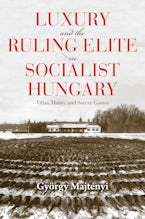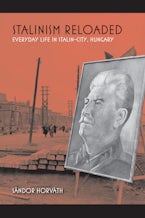- Home
- Studies in Hungarian History
- Children of Communism
Preparing your PDF for download...
There was a problem with your download, please contact the server administrator.
Children of Communism
Politicizing Youth Revolt in Communist Budapest in the 1960s
Translated by Thomas Cooper
Published by: Indiana University Press
300 Pages, 45 b&w illus.
- eBook
- 9780253059710
- Published: March 2022
$31.99
Other Retailers:
As the sun set on June 8, 1969, a group of teenagers gathered near a massive tree in a main square of Budapest to mourn the untimely death of Rolling Stones guitarist Brian Jones. By the end of the evening, sirens blared, teens were interrogated, and the myth of the most notorious juvenile gang in Budapest was born.
The origin of the Great Tree Gang became an elaborately cultivated morality tale of the dangers posed by allegedly rebellious youths to the conformity of communist communities. In time, governments across Cold War Europe manufactured similar stories about the threats posed by groups of unruly adolescents. In Children of Communism, Sándor Horváth explores this youth counterculture in the Eastern Bloc, how young people there imagined the West, and why this generation proved so crucial to communist identity politics. He not only reveals how communism shaped youth culture, but also how young people shaped official policy.
A fascinating read on the power of youth protest, Children of Communism shows what life was like for the first generation to have been born under communism and how one evening spent grieving rock and roll under a tree forever changed lives.
Introduction
1. The Hippie Stroll
2. The Trial: Casting
3. How Hooligans Are Made
4. Youth Protection
5. The Police and Uses of the Urban Space
6. The Socialist Tabloid Press
7. Protest in a Diary
8. Girl in the Gang
9. Memory
Conclusion
Bibliography
Index
Sándor Horváth is Senior Research Fellow and Head of the Department for Contemporary History at the Institute of History in the Research Centre for the Humanities at the Hungarian Academy of Sciences. He is author of Stalinism Reloaded: Everyday Life in Stalin-City and Hungary and founding editor of the Hungarian Historical Review.
"There is no other book like this: a fascinating microhistory that lays bare Communist Eastern Europe in all its contradictions. Children of Communism brings to life a forgotten and fascinating moment from the summer of 1969. Budapest of that time might as well be as far away as the moon Neil Armstrong was about to set foot upon, yet Sándor Horváth brings it up close. In his wonderfully-researched narrative, the hippies of Castle Hill help us understand how the repressive state drew upon social norms, how alternative cultures and communities could nonetheless flourish in Communist Hungary, and how political opposition could emerge from countercultural performance."
~Padraic Kenney, Indiana University
"Horvath's highly original study of youth in Budapest is a major contribution to the history of Hungary in the Communist era, and also to the wider social history of Europe in the post-1945 era. His vivid exploration of the state and police archives, as well as his interviews with some of the original participants, skillfully shows how the regime's clumsy efforts to repress the disorderly actions of a group of young people laid bare the tensions between state and society in post-1956 Hungary as well as the new attitudes of young people in the 1960s."
~Martin Conway, University of Oxford
"The study of youth culture and youth protest in the Communist countries of East-Central Europe during the post-Stalin era has advanced a great deal over the past three decades, thanks to the opening of crucial archival collections and opportunities for scholars to interview key participants. Sándor Horvath's book is an invaluable contribution to this burgeoning literature, setting a lofty standard for future studies of the topic. Horvath examines youth culture in Hungary in the 1960s in the larger context of Communist rule and the interactions between the Communist regime and Hungarian society. He shows how the authorities — at times deliberately but often inadvertently — helped to shape the identities of young people in Hungary and, conversely, how the activities of youth groups and individuals influenced the regime's efforts to maintain strict control at a time when information about rock music and other 'alien' practices and ideas of the younger generation in the West was increasingly filtering across the Iron Curtain, especially into Hungary and Poland. Horvath's book will appeal to a wide audience and will be particularly rewarding for scholars interested in youth culture, Communist systems, protest movements (contentious politics), and 20th-century Hungarian politics and society."
~Mark Kramer, Harvard University
"Relying on oral histories and other primary sources, Horváth explores how the Communist regime manipulated state-sponsored tabloid media during the trial to legitimize its own role as guardians of public safety and to portray the youth as social deviants who were instruments of Western-style decadence. . . . Highly recommended."
~C. P. Vesei, Baldwin Wallace University, Choice
"A very timely book, demonstrating why the Soviet political police were worried so much by the "criminal Americanization" that was reaching Soviet youth from socialist Hungary as well. Horváth's book is an original explanation of the role of "youth revolt" during the 1960s, which became the pattern for social and cultural developments in countries of the Warsaw Pact."
~Sergei I. Zhuk, Hungarian Studies Review
"Horváth shows how the state and youth actors were involved in social discourse that, on the one hand, formulated state socialist norms of behavior for young people or marked deviant behavior, and on the other hand, served to continuously justify existing power relations. (translated from German)"
~Maren Francke, H-SOZ-KULT



